
Your angel shrieks as the lance passes through her side. She plummets to the ground, a mixture of blood and feathers.
You slump to the ground - wounded, but not defeated. The mocking laughter of your opponent is like a hammer blow in your ears.
There's a spell that could save you, you're sure of it. You just need time to think...
"Its my attack phase. Wandering Ones hits you for 1. GG."
When the pain fades, you're back in your sanctum with your rival’s last words still echoing in your ears. Your familiar has propped you up on your lounge and used a mox ruby to heat up a pot of coffee. You groan and stretch, wincing as your clumsy hands dislodge a pile of books. On top of the resultant heap is a damaged, worn out tome. You flick through it absent-mindedly before your eye is caught by a chapter heading. Four hours later, you look up from your book to realise the mox has set fire to the coffee table again. You ignore it. There are more important things to do...
Greetings, gentlefrogs!
This series is a study of Sun Tzu's Art of War and how we can use it to be more successful at playing multiplayer games, particularly EDH. I’m writing about multiplayer because I spent my high school years slinging cards in a big group and learning at the feet of Anthony Alongi and the Ferret, neither of whom is presently in the business of doling out ladles of multiplayer wisdom. I’m writing about EDH because it’s the most popular casual format right this very moment.
The article format is as follows: Anything Sun Tzu wrote is in quote tags, and anything under that is a paragraph that expands on that thought and applies it to multiplayer. I’ve added some examples of specific cards that work in that scenario, but hopefully not enough to date the article. I intend to write between one sentence and one paragraph for each ‘verse’ in the Art of War. At one article per chapter, we're looking at a 13-article series. With some late nights and lots of coffee, I should be able to produce one piece of polished work each month.
The Art of War is a well-known classic – in the public domain, no less! You can find copies on your local bookshelf, but also online or on your phone, if you have such a fancy device. The Art of War was written primarily as a guide for leading Chinese troops to victory in the periods between 700-400 B.C., but has also seen practical application in business, education and presumably teen romance, so it’s ripe for adaptation for use in complex issues like collectible card games.
It is also a fairly short book and thus much easier to adapt than the Bible, which was a very close second choice.
For those of you playing at home, a copy of Sun Tzu is obtainable here. I’m quoting it in full for convenience, but this is the unsullied text.
http://en.wikisource.org/wiki/The_Art_of_War_%28Sun%29
1. Sun Tzu said: The art of war is of vital importance to the State.
Theory is the way we get better at Magic without playing Magic. Just thinking about Magic is ok too, but in the same way that gold-fishing doesn’t tell you if you can go undefeated at a tournament, thinking about Magic without taking in some external stimulus doesn’t tell you if you have what it takes to take on your friends in a cutthroat game of Multiplayer. Thus, the study of theory informs the way you think about Magic, which improves the way you think, which makes you hungrier for more theory, which means you go looking for more articles to think about. Then you curl up into a ball and emerge three days later as Jon Finkel.
Consider your first Magic game. Consider the game that Magic was when you first played it. You may have had a starter deck, or a pre-con, or an intro pack, or someone else’s old cards and you played against people who were in much the same state as you – pristine, innocent, unaware of the competitive side of magic, with its carefully arranged mana curves, with lands that cost more than your first deck, etc. (Incidentally, remember the first time you opened a rare land and felt disappointed because it wasn’t a dragon or something else cool? Ha! Good times).2. It is a matter of life and death, a road either to safety or to ruin. Hence it is a subject of inquiry which can on no account be neglected.
I will get to the point in just a moment, but let me continue for just a little longer – if you study the theory of Magic you will learn horrible, awful truths. Your favourite deck will seem clunky, your favourite cards underpowered and it will turn out that rule you’ve always thought was weird... was actually made up by Mike, the one who always uses it to his advantage. Once you know these things, you can’t unlearn them and you can’t retreat into ignorance. You can either try to ignore the depth of knowledge and theory that is available on the internet and forever feel the tiniest disconnect when a friend looks at a Wrath of God in his booster and says “Ugh... why would you want to destroy your own creatures as well?”, or you can dive in and drive yourself onwards in the pursuit of self-improvement and perfection. The point is, once you make the decision, you need to imagine Mr. Miyagi is standing in front of you.
http://www.youtube.com/watch?v=jjo_jTVKMcU
Thanks to the magic of the Internet, a somewhat blurry and muffled Mr. Miyagi teaches us the most important tenet of theory – either you are a fan of theory, or you’re not. Sun Tzu refers to Life and Death and other evocative, dualist concepts, but that’s just because binary wasn’t a common concept back in the day. Theory is binary – you either do it, or you do not. There is no ‘try’. Just dabbling in it will give you a small advantage against your friends if they’re playing blind, but if someone knows more than you, then *squick* - squashed just like grape.
3-6. The art of war, then, is governed by five constant factors, to be taken into account in one's deliberations, when seeking to determine the conditions obtaining in the field. These are the Moral Law, Heaven, Earth, The Commander and Method and Discipline.
The Moral Law causes the people to be in complete accord with their ruler, so that they will follow him regardless of their lives, undismayed by any danger.[/b]
The first thing you need to ask in deck construction is this: “Will my deck do what it’s meant to do when I goldfish?” If the answer is yes, the second question is this: “Will my deck do what it’s meant to do when other decks are trying to stop it?”
The degree to which this is true of your deck is resilience, a word I'll be returning to a few times throughout this series.
7. Heaven signifies night and day, cold and heat, times and seasons.
Heaven is invisible. In Multiplayer, the cards are the least important things at the table. What matters is what’s going on in everyone’s heads – who are they friends with? Who are they afraid of? Who has made the most enemies? Who has been waiting for one last combo piece before they go off? Will the next card be that piece? Who has the biggest reputation for backstabbing? How long until the next board wipe?
8. Earth comprises distances, great and small; danger and security; open ground and narrow passes; the chances of life and death.
Earth is visible. The Earth is made up of several building blocks. In Magic, these building blocks are as follows – The number of attackers each side possesses. The number of blockers each side possesses. The number of utility creatures each side possesses. The hand size of each player and how many cards each player draws each turn. When you’re weighing up the chances of life and death for your individual troops, ask yourself who is likely to have removal in hand and who’s likely to cast it the next chance they get. You can and should also consider - how long until the next board wipe?
Bryndon’s Theory of Inevitability: As turns progress in EDH, the probability of a wrath approaches one.”
The board wipe is coming and it will wipe your board when it comes. Plan accordingly.
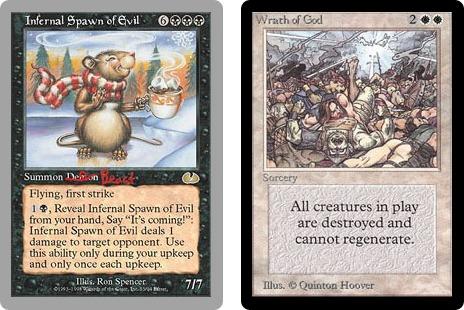
What do these two cards have in common?
[B]They're coming.[/B]
The Commander, intuitively enough, refers to the General choice that you make and the generals sported by your rivals. If you know of the General, you can predict what will follow. Rofellos will ramp into massive amounts of mana and attempt an infinite combo with one of three different cards. Azami will build up a storm count and card draw before taking out every player with an arbitrarily large Brain Freeze or Mind’s Desire. Teneb will use reanimation, Uril and Zur will use auras, Rafiq will use exalted triggers backed up with control elements like counters, granting shroud, white removal and so on. These different possibilities give you the ability to predict the kind of opening hand your opponent favours. Conversely, sneaking a reliable victory condition into your Pheldagriff deck or playing a kooky off-beat legends general filled to the brim with your most cutthroat cards is a good way to surprise your opponents (although if you try to go back to group hug afterwards, you're in for a beating).9. The Commander stands for the virtues of wisdom, sincerity, benevolence, courage and strictness.
10. By method and discipline are to be understood the marshaling of the army in its proper subdivisions, the graduations of rank among the officers, the maintenance of roads by which supplies may reach the army, and the control of military expenditure.
This is a deck-building virtue as much as it is a play virtue. Does your deck have a game plan (e.g. combo out, lock everyone else down or play a really BIG creature with a lot of evasion)? Can it realistically achieve that game plan and if necessary, can it kill seven people? Does it do something each turn to advance your game plan or does it do something each turn to disrupt your opponents? Have you got enough mana and is it mana of the right sort? Do you have tutors if you need them? Do you have enough threats?
In-game, this is the ability to resist throwing down a big swingy bomb type card or hurling removal at your opponent’s stuff to ‘make something happen’, or ‘just to do something’ or ‘because I just drew it’ or anything involving the word ‘chaos’. It also involves resisting the urge to commit more troops to the board if you’re aware that there’s a board wipe approaching.
In summation, these basic principles are a part of absolutely every multiplayer game and most likely already known to experienced players. If you know these factors and start observing them in-game, you won’t necessarily win, but you’ll cut down on the number of catastrophic failures you experience by being the first one out or by waiting until exactly the turn after the control player drew Swift Silence before playing your ‘fully sick combo’.11. These five heads should be familiar to every general: he who knows them will be victorious; he who knows them not will fail.
When you’re holding the game-wrecking or game-ending spell (the exact nature is not really important at this point), consider your targets carefully. Some people can handle an attack or two. Other people react badly to an attack, by losing quickly or by conceding like pansies. Some people can thrive on an attack (Darien, King of Kjeldor can shrug off your attacks like a boss). Who looks weak? Who looks weak and has this nasty habit of winning if they’re not finished off once and for all? Who has the most threatening ‘thing’ on the table? (Ajani Vengeant at 7 counters, Planar Collapse, Illusionary Mask, a morph creature, Rofellos + Umbral Mantle, etc.)12. Therefore, in your deliberations, when seeking to determine the military conditions, let them be made the basis of a comparison, in this wise:
1. Which of the two sovereigns is imbued with the Moral law?
Who has the most potential to alter the game state between now and your next turn? Which General is the more powerful choice? Which player is “better”? (If you don’t know, ask. Tap one of the cards in your hand as though considering who to Mind Twist for 7 and ask the question once, maybe twice for emphasis. People will be scrupulously honest about the answer).2. Which of the two generals has most ability?
Who has allies who will leap to their defence? Who has blockers still open? (By the way – never attack into blockers. More on that in later chapters) Who will be in a position to attack during their next turn? Who has protection in the form of counterspells, white creature-protecting spells, the ability to recur lost cards, enchantments, etc.?3. With whom lie the advantages derived from Heaven and Earth?
Who builds their deck to “do one thing” rather than go for a toolbox approach? If they specialise, throwing them off their game plan can make their entire deck worthless. If your opponent is known for toolboxes, there is a chance they can produce exactly the right narrow answer card to deal with your threat.4. On which side is discipline most rigorously enforced?
Creatures with enter-the-battlefield capabilities, Eldrazi (especially multiple Eldrazi), Akroma variants, anything that can be reanimated, Baneslayer Angel, Sphinx of Magosi all contribute to the “Yes” box when considering this column.5. Which army is stronger?
6. On which side are officers and men more highly trained?
Who makes the most use of their utility creatures? Cards like Royal Assassin and Avatar of Woe are pretty obviously amazing, but so is Archivist, or even Llanowar Elves. Remember – Llanowar Elves and friends aren’t like ‘forests on legs’. They’re like Mox Emeralds on legs. They contribute to the power of the opposing army and they make horrible things happen to you if left unchecked.
How do your opponents react to attacking them in the early game? How do they respond in the late game? If a guy makes a point of hunting you down remorselessly if you attack him early on – ask yourself if the damage you do will be enough to make it impossible for him to mount an effective offense. A few points of health aren’t enough – you need to seriously impact either his lands, hand, graveyard (if he uses recursion), or utility creatures.7. In which army is there the greater constancy both in reward and punishment?
13. By means of these seven considerations I can forecast victory or defeat.
With an accurate understanding of these factors... I maintain that you can really only learn to not-fail at Magic. In a high-powered game of Magic, Player 1 can play Tooth and Nail for Darksteel Colossus and Platinum Angel, Player 2 can Channel+Emrakul to attack Player 1, Player 3 can wipe the board with a Reiver Demon and Player 4, with no permanents, can ramp into a comet storm and eliminate players 1 and 2. Board states can change dramatically each turn. You can see who is going to be in a winning position over the next turn or three, but unlike chess, you can’t see all the way from turn 1 through to the final turns of the game as you set up the game pieces.
14. The general that hearkens to my counsel and acts upon it, will conquer: let such a one be retained in command! The general that hearkens not to my counsel nor acts upon it will suffer defeat:--let such a one be dismissed!
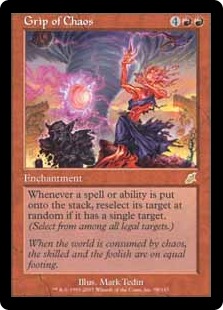
Does not play well with Thieves' Auction
or Confusion in the Ranks.
Or other people.
Tangent time: “Flipping a coin” to make decisions derails multiplayer games. In a trusted setting (i.e. among friends) you should already know who you need to attack early and who you can leave till later. In an untrusted setting, one where you’re playing against complete strangers, it serves you better to play detective on the first turn. Do any of the strangers know each other? (Evidence: referring to mutual friends or events from outside the card shop, talking openly about the contents of their deck, etc). There’s a chance they’re allied. Wipe one of them out quickly. Do any of the strangers have lands that are better/more expensive than yours (Dual Lands > Sol Ring and powerful artifact accelerants > Ravnica Lands > Fetchlands > most other tap lands) or more pimp than yours? Failing that, who’s got the tier 1 general or is running mono blue? If there’s a huge mana imbalance, go after those people first because otherwise they’ll be able to use their resources more efficiently than you later on in the game.
No one is ever happy to be attacked or become a target, unless they’re severely mentally imbalanced or have a combat trick they’ve been dying to use. If you have a reason – i.e. “you’re the biggest threat to me, because X”, or “I believe you have a combo, so I’m in ur face, disruptin ur planz”, or “You have fancy lands, which means you’ll be able to pull off more shenanigans in the late-game”, people will wait until they have a reason to attack you back. When you roll a dice in the early game, you're not just picking a target for a single attack, you're making an enemy in the mid-to-late game. In general, when you choose to 'inject chaos' into a game, you typically create an ordered sequence of events in which one person is angered by a spell and then brings down disproportionate response on you later on in the game. That... is not chaos. Chaos is Fiery Gambit, a card I highly recommend if you want people to cheer when you announce your 'random moment'. Thus ends this tangent.
15. While heeding the profit of my counsel, avail yourself also of any helpful circumstances over and beyond the ordinary rules.
Sun Tzu has a lot of good advice to offer on game theory, but so does Mike Flores, Abe Sargent, Sirlin’s Playing to Win series, Anthony Alongi, The Ferret, someone important who I’ve no doubt forgotten (please, flame me in the forums! Increase the knowledge base!), and of course the articles about multiplayer on this very site are pretty good. The more you know, the more likely you are to find a framework that works for you.
16. According as circumstances are favourable, one should modify one’s plans.
Don’t just adapt because your first win condition was countered and your opponent has thrown down a big fat creature in response. Adapting when you’re losing is good, but adapting when you’re winning is even better. If you could easily win just by beating a guy down for a few more turns, do that. But wipe out his lands while you’re at it, or go set up a combo, or find an extra dude to beat with. The reason is twofold: Going ludicrously all-out to kill someone makes it more memorable, and it makes it harder to stop you in your tracks just by taking out one threat.
17. All warfare is based on deception.
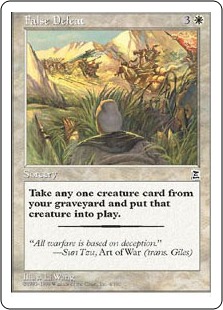
"Hmm, no corpses.
I guess they're really, really dead then."
18. Hence, when able to attack, we must seem unable; when using our forces, we must seem inactive; when we are near, we must make the enemy believe we are far away; when far away, we must make him believe we are near.
See above. This stratagem is a good reason to play such gems as Dramatic Entrance, Cauldron Dance, Sneak Attack, etc. Similarly, consider using pitch cards that aren’t Force of Will to wreak havoc on your opponent’s combat math. “Oh sure, he’s ‘tapped out’... but is he tapped out?”
19. Hold out baits to entice the enemy. Feign disorder, then crush him.
A single Planeswalker, alone on the field. A utility creature with lightning greaves on it, as though it was the only thing you had to play on it. The attack is declared! You play Captain’s Maneuver. Bam! The opponent is gone! Point this out, too. It makes it so much sweeter when you’re legitimately without any answers in the next game and they’re like “Screw you - I’m not falling for that again”.
20. If he is secure at all points, be prepared for him. If he is in superior strength, evade him.
You can’t always rely on your Machiavellian wiles, killer looks and tendency to laugh maniacally when you play a combat trick to keep you in the catbird seat. If your #1 target can’t be attacked, make sure you can’t be attacked. If your opponent is able to crush you in a stand-up fight, don’t have a stand up fight. Sandbag your defences, buckle down. Throw your targeted card draw in someone else’s direction. Keep a fog spare for yourself but use combat tricks on someone else’s behalf. Make someone else the bigger threat by words or just by heaping spells at them.
21. If your opponent is of choleric temper, seek to irritate him. Pretend to be weak, that he may grow arrogant.
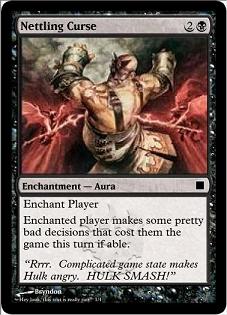
So, when you attempt to irritate your opponents, do just that, nothing more. By all means, tell them that you're planning to completely reduce their deck to ashes over the course of the next turn with your superior cards if it means they'll hold back a few answers for a threat that's not coming, or to goad them into over-extended so that you can wrath them. But if you do that, don't follow that up after the game with "LOLOLOL YOU SUCK SO HARD" or any variation thereof. Instead, shake their hands and thank them for the game.
When attempting to be weak, don't whine. If you say "Why are you attacking me? I don't have any dragons, I don't have any blockers, I'm just sitting here complaining about how useless my cards are"... you're being attacked because you're whining. In contrast, when you're in a weaker position or trying to lull your opponent into a false sense of security, try pumping your opponents up a bit- “Dude! That attack rocked! I bet Mike couldn’t handle your DSC and Emrakul at the same time!” “Dude! Nice spell! If the rest of your deck is that awesome you’re gonna rock this game!” “Whoa, your army is huge!”
22. If he is taking his ease, give him no rest. If his forces are united, separate them.
“Why are you attacking me?” ask my friends. “I’ve got no creatures, I’m just trying to get some mana!” – there were two ways that story could end. I could have attacked them, but I didn’t, because I was a nice person. They summoned Azami the next turn and combo’d out. Shamed and disheartened, I went home, sold my soul to the powers of darkness and became a kitten-kicking evil overlord. There is no point in Magic where you can attack your opponent and have him be ok with it and you be 100% likely to emerge unscathed. Don’t look for that point. Look for the point where you can attack your opponent, wreck him and then win the game.
23. Attack him where he is unprepared, appear where you are not expected.
This is difficult in a game where you’re required to announce that you’re summoning creatures and announce your attack phase, but not impossible. But, Magic is a game with lots of resources to consider. In addition to a player’s creatures, life and planeswalkers (the easy stuff to kill), there are plenty of other ways to attack your opponent – their hand, graveyard, cards in library (go for specific cards a la Jester’s Cap, not chunks of the library like Glimpse the Unthinkable), ability to act without being hampered (Iona, Shield of Emeria, Arcane Laboratory, Woebearer Demon, etc.) and so on. The more inventive you are, the better – if you’re using a combo or lock that someone has never seen before, you’ll get more high fives and less groans when you pull it off.
24. These military devices, leading to victory, must not be divulged beforehand.
If you have a sweet new combo, an awesome beater, or even a brand new deck that you believe will kill everyone at the table in a way too AWESOME to even imagine... don’t tell anyone about it. It decreases the awesomeness of the moment that you’ll experience when you do something truly unexpected. If you tell people what your deck does, it’s unlikely they’ll share in the joy of creativity with you. Instead, they will most likely pack a Meddling Mage, Pithing Needle or just hold a counterspell until you try to pull off your sweet new maneuver.
(By the way, have I told you about my awesome new plan for Teneb? I’ve got all these great fatties, right, plus Delirium Skeins and Living Death. It’s gonna be so awesome! I just need a few more cards...)
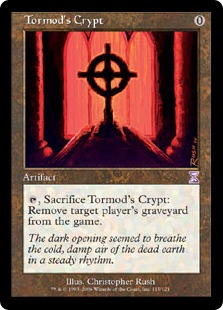
"Reanimator, you say? No no, I love hearing about your decklists. Tell me everything."
25. Now the general who wins a battle makes many calculations in his temple ere the battle is fought. The general who loses a battle makes but few calculations beforehand. Thus do many calculations lead to victory, and few calculations to defeat: how much more no calculation at all! It is by attention to this point that I can foresee who is likely to win or lose.
This verse has a lot to do with deckbuilding, as much as it does with calculating the game-state – although the mana curve in EDH is pretty stretched, with business spells easily starting at 5CMC and going up to 9CMC, ask yourself – is there something you can do with each turn? If you have no one-mana spells, put in some more fetchlands. 1-4 mana = tutors, ramp, cheap removal. 4-8 mana = efficient beaters, wraths, recursion spells and big effects. 8+ mana = game finishing bombs.
After that, there’s a handy questionnaire:
• Do my beaters have a relevant form of evasion? E.g. flying, trample, landwalk, protection, shroud, etc.
• What do I do against an early combo? Do I have disruption, room for Defense Grid, counterspells, a way to give myself shroud or do I need to make friends with a blue player?
• Do I have a way of recurring used cards or drawing additional new cards to help win a long game? Can I gain some extra life, preferably at someone else’s expense?
• If my group doesn’t soft-ban combos, do I have a 2-3 card combo to end a long game quickly?
• How do I deal with the latest fad? (e.g. cheating Emrakul into play in the early game)
• Can I deal with the most dangerous general in my metagame? Do I have early spot removal or a few sweepers?
• Do I have a land, enchantment or artifact that could help win the game for me if my opponents don’t pack enough land/enchantment/artifact hate?
• Do I have some way of dealing with an opponent’s lands, enchantments or artifacts?
• If my deck’s colours (Black, Red) make it impossible for me to deal with enchantments or artifacts, does the raw power and easier mana requirements I’m gaining make up for the versatility I’m losing?
Thus ends chapter one.
Comments